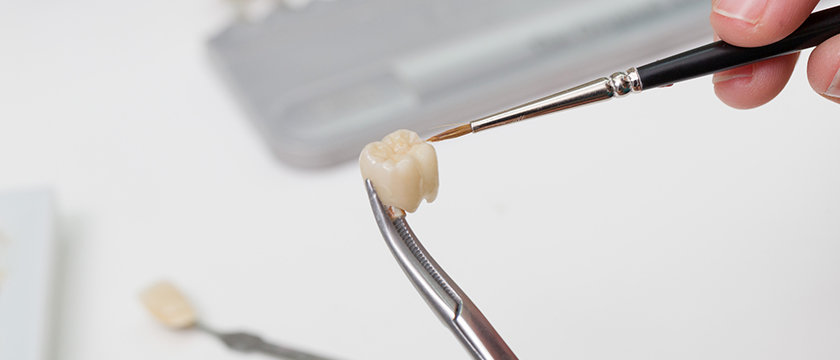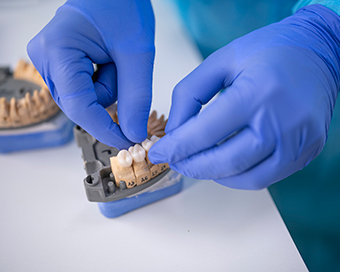 10 Aug 2021
10 Aug 2021
Dental crowns, sometimes also called caps, are small, tooth-shaped covers that are placed over a natural tooth. These prosthetics extend to the gum line, covering the affected tooth from top to bottom.
A well-made crown looks just like a natural tooth and allows you to chew food the same way you would with your original dentition. This makes crowns an excellent solution for both aesthetic and functional oral issues. You can learn more about this time-tested dental care option in the guide below.
Why is a Dental Crown Needed?
Dental crowns are typically used to restore the appearance and function of unsightly or damaged teeth. They may be needed when your tooth:
- Is broken or cracked
- Has been weakened by extensive dental cavities
- Has a large filling with too little natural structure left to support chewing
- Is misshapen or significantly discoloured
They may also be used to support a dental bridge or cover a titanium implant.
Children are sometimes treated with dental crowns for slightly different reasons. A child might receive a crown to save a decayed primary tooth until it falls out on its own, limiting the need for more stressful dental procedures later. Crowns are also used to protect a tooth when the child has poor oral hygiene habits and is at high risk for decay. Your family dentist will let you know if your child could benefit from dental crowns.
What Are Crowns Made Of?
Dental crowns are made of different materials. The option your dentist selects will depend on your needs and budget. The most common materials include:
- Porcelain. Porcelain is an extremely popular material for crowns, mimicking the look of a natural tooth almost perfectly. They are reasonably durable and long-lasting, but they do tend to chip or crack more easily than other types of crowns.
- Metal. Metal crowns are an excellent choice when durability is a top concern. These crowns are usually made from stainless steel or gold, but other metals like palladium or nickel are sometimes used. They last a long time and are flexible enough to avoid damaging your opposing teeth on contact. However, they are very noticeable in the mouth and are not recommended if you are seeking a natural look.
- Porcelain-Fused-to-Metal. Patients who enjoy the look of porcelain but are worried about its fragility may opt for a metal crown with a thin layer of porcelain applied over it. This type of crown combines the best features of both of its components to create a long-lasting and attractive dental prosthetic. Their main drawback is that the dark metal margins become very obvious if the gums around the crowned tooth recede.
- Resin. Resin composite crowns are made from the same material as composite fillings. They are relatively inexpensive, but they are the least durable option available. They also often blend poorly with the other teeth in your mouth thanks to their off-white colour and tendency to lose their polished finish quickly.
Steps Involved in Placing a Crown on a Tooth
There are two major steps to placing a crown: the preparation and the application.
Preparation
 The preparation phase starts with an initial examination to ensure that the tooth is healthy enough to be crowned. Your dentist might take some x-rays to get a look inside your tooth and determine whether a root canal is needed to minimize the chance of infection. If this is the case, the rest of the crown preparation procedure will not take place until the root canal is completed.
The preparation phase starts with an initial examination to ensure that the tooth is healthy enough to be crowned. Your dentist might take some x-rays to get a look inside your tooth and determine whether a root canal is needed to minimize the chance of infection. If this is the case, the rest of the crown preparation procedure will not take place until the root canal is completed.
When your tooth is ready, your dentist will numb the area around the tooth using a local anesthetic. They will then shave down the sides and biting surface of your tooth to make room for the crown. Teeth that have already lost a lot of surface area to breakage or decay may need to be built up instead.
Once your dentist is satisfied with the new shape of your tooth, they will take an impression of this tooth and the teeth around and above it using a special putty or a digital scanner. These models help ensure that your crown fits well and does not interfere with your natural bite.
After this, you will be given a temporary crown to cover your shorn-down tooth while your new permanent crown is fabricated. This process typically takes 2 to 3 weeks, and you will wear your temporary crown during that entire time. To make sure it stays in place:
- Do not chew sticky foods like toffees that could pull it off your tooth.
- Avoid chewing on this side as much as possible, especially if you eat hard foods like carrots and crusty bread.
- Floss carefully, sliding the floss out of the spaces between your crowned tooth and its neighbours rather than pulling on it.
Application
The application phase is much shorter than the preparation phase. Your dentist will take the temporary crown off your tooth and check whether the newly fabricated permanent crown fits properly and matches the colour of the rest of your teeth. If they are satisfied with these things, they will apply adhesive cement and glue your permanent crown into place.
How Long Do Dental Crowns Last?
Many crowns can last between 5 and 15 years, but it is possible for them to remain intact for much longer. How long yours will last depends on:
- What materials it is made of
- How much force is placed on it when you chew
- How good your oral hygiene is
- Whether you engage in any harmful oral habits, such as grinding your teeth, chewing ice cubes, or biting your fingernails
Taking good care of your teeth should allow you to get much more use out of your crown over the years.
Do Crowns Require Special Care?
No. A crowned tooth must be treated the same as a natural tooth. This means that you must brush it and floss around it just as you would any other tooth. Pay special attention to the margins of your crown, where the tooth disappears into your gums. This area is easy to miss but prone to decay and gum disease, which could impact the lifespan of your crown.
How Much Do Crowns Cost?
The cost of a crown depends on the skill of your dentist and which materials you choose. Your insurance may cover a portion of this expense depending on your coverage and whether the crown is considered medically necessary.
If you are concerned about the price, your dentist will be able to recommend the options best suited to your budget. They can also provide an estimate of how much you will be required to pay after your insurance covers their portion.
Protect Your Teeth with Crowns from Your Expert Dental Team
Your dental crowns will be with you for a long time, so choose a dentist who will place them with skill and care. Trillium Smile Dentistry is here to help you with all of your dental needs, including everything from crown placement to wisdom tooth extraction. Call us at 647-371-1894 or request an appointment online to see our friendly staff about getting a quality dental crown that will keep your tooth safe for many years.
